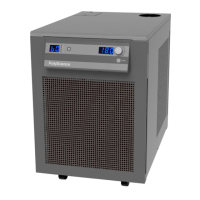110-392 12
Process Coolant
Suitable Fluids
WARNING: For units that use cooling fluids.
Use only fluids that comply with safety, health, and equipment compatibility requirements. Read the safety
data sheet for the fluid being used carefully before use.
CAUTION: DO NOT USE
Caustic, corrosive, or flammable liquids
Automotive anti-freeze*
Hard tap water*
Deionized water with a specific resistance >1 meg ohm
Concentrations of acids or bases
Solutions with halides: chlorides, fluorides, bromides, iodides, or sulfur
Chlorine bleach
Glycerine
Syltherm fluids
*
At temperatures above 40°C, additives or mineral deposits can adhere to the heater. If deposits are allowed to build up,
the heater may overheat and fail. Higher temperatures and higher concentrations of additives will hasten mineral
deposits
The Chiller can accommodate a variety of coolant fluids (water, glycol mixtures, etc). For most applications above 20°C (68°F),
distilled water is satisfactory. For operation below 20°C (68°F), the Chiller must be protected with an antifreeze solution.
Ethylene glycol (laboratory grade) and water in a 50/50 mixture is satisfactory from +20° to -15°C (68° to 5°F). Select a fluid
that is compatible with the Chiller’s wetted parts (brass, bronze, stainless steel, EPDM rubber, nylon, PVC).
WARNING: Operation below 20°C (68°F) requires antifreeze in the circulation fluid. Do not use automotive
antifreeze as the additives may be harmful to the Chiller's wetted parts.

